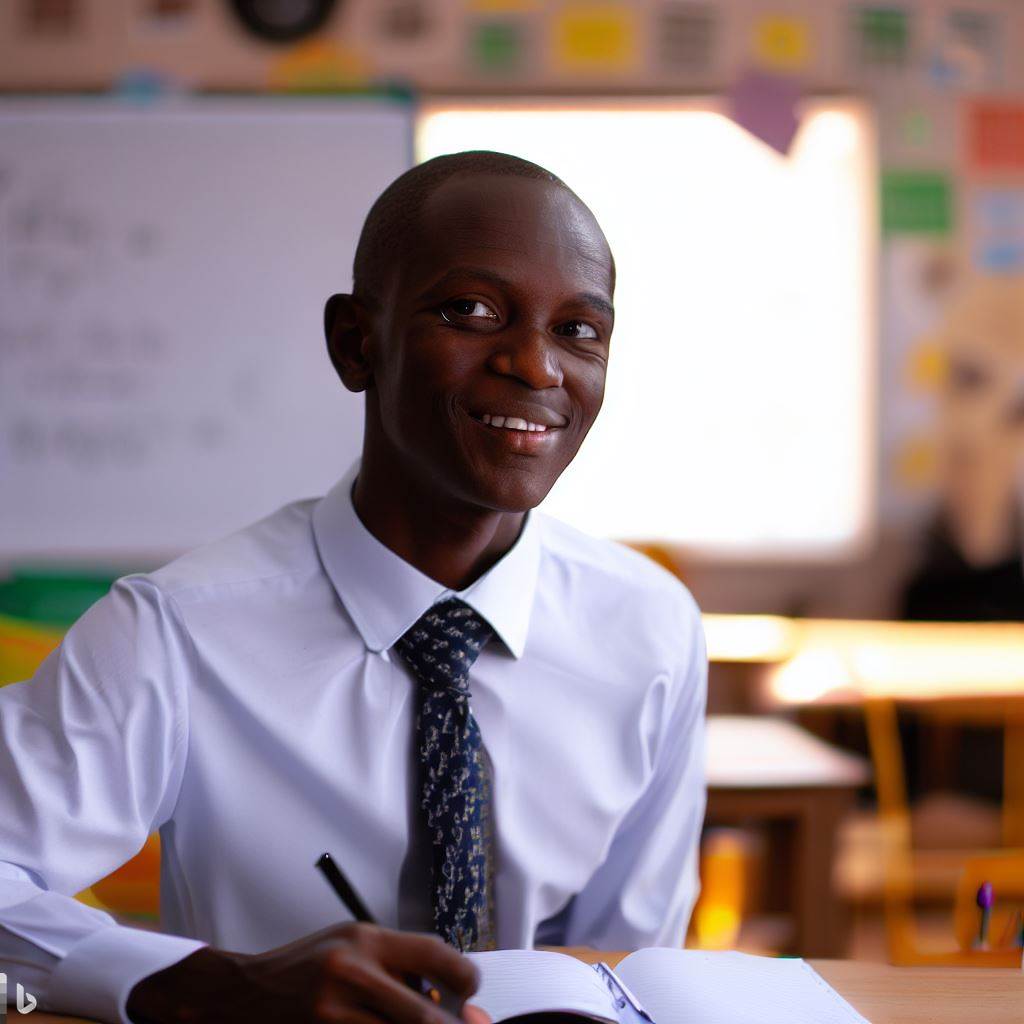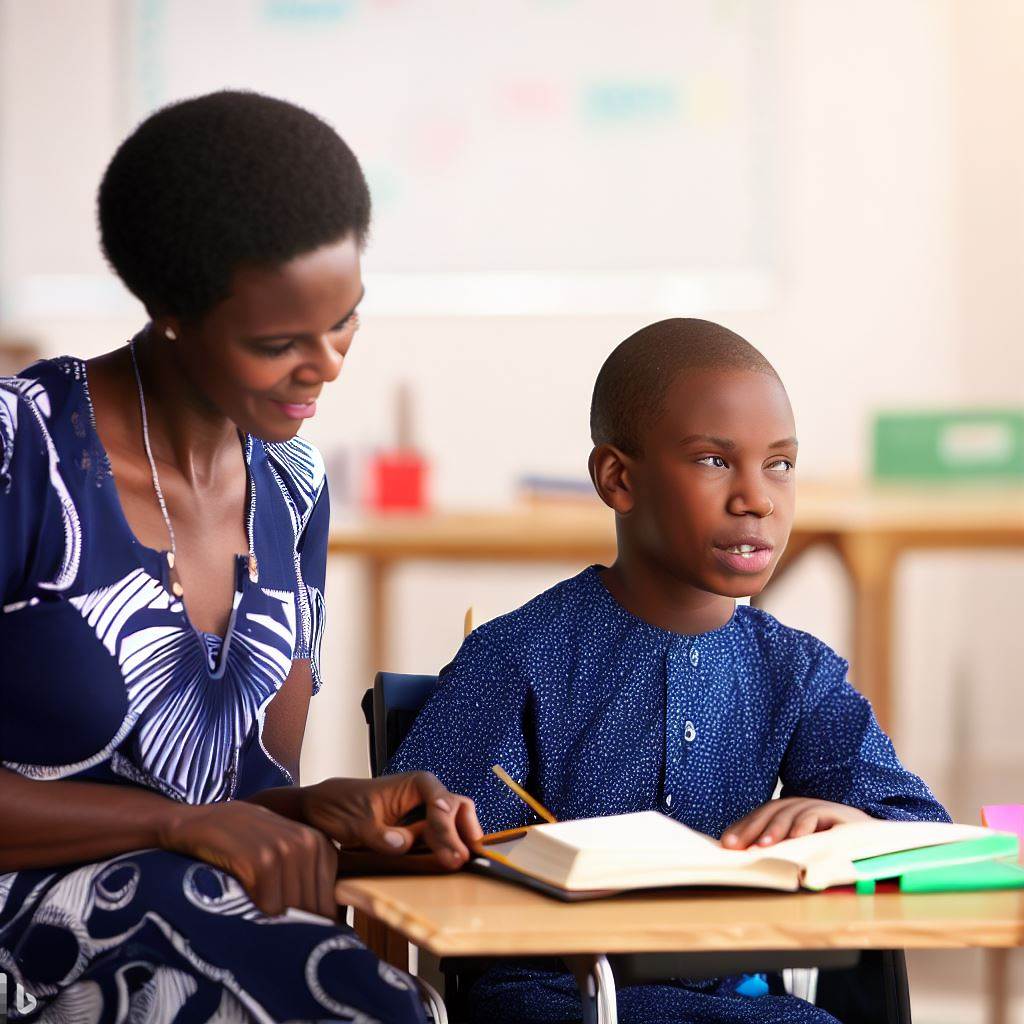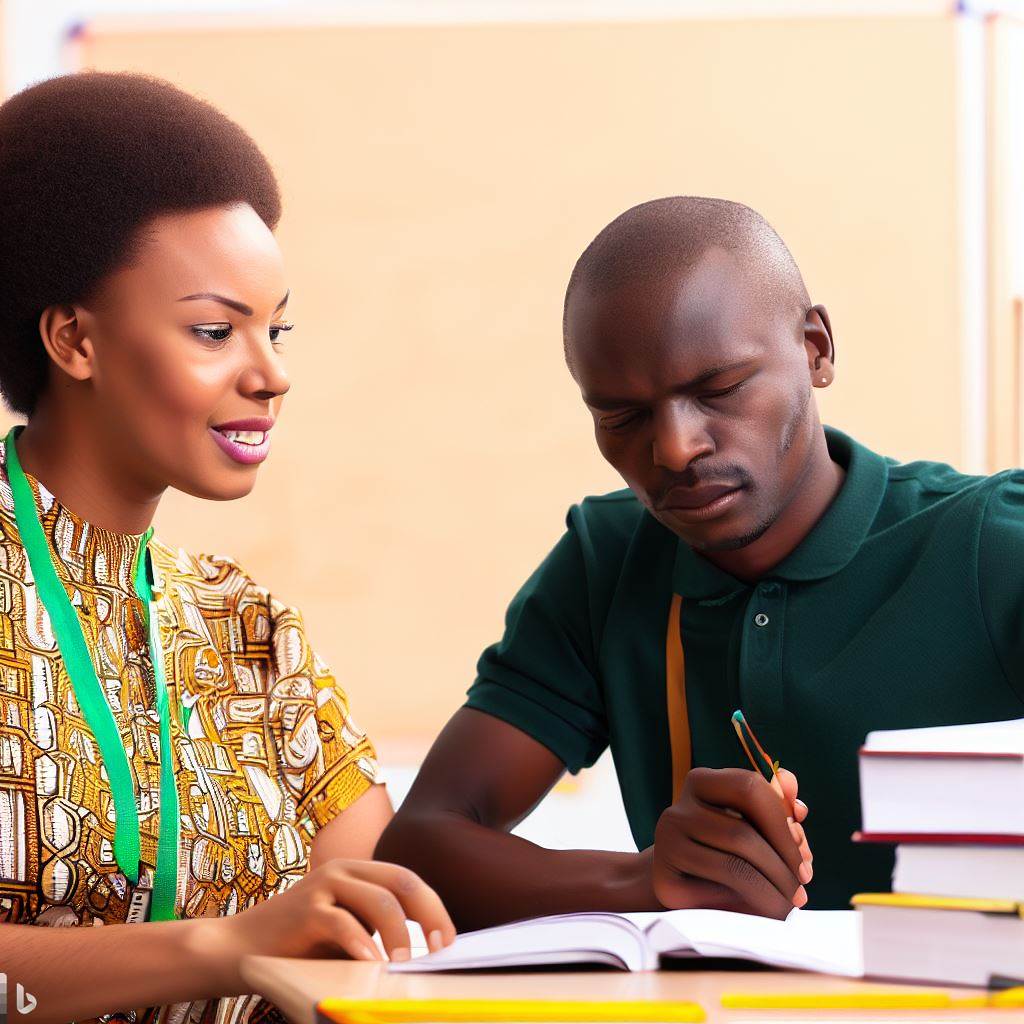Introduction
Special education is a specialized form of education for students with disabilities. Special education is important in Nigeria to ensure inclusive education and equal opportunities for all.
The purpose of this blog post is to provide a comprehensive overview of special education in Nigeria.
- Addressing Diversity: Special education caters to students with diverse learning needs, ensuring inclusive education.
- Blog’s Aim: Illuminate special education’s role, challenges, and strategies, fostering understanding and advocacy.
History of Special Education in Nigeria
Origins of special education in the country
Special education in Nigeria can be traced back to the colonial era when it was introduced to cater to the needs of physically disabled children.
Key milestones and developments over the years
Throughout the years, special education in Nigeria has seen significant milestones, including the establishment of special schools and the passing of policies supporting inclusive education.
Evolution of special education to meet student needs
Special education in Nigeria has evolved to go beyond the education of physically disabled individuals to include students with intellectual and developmental disabilities.
It has also shifted towards a more inclusive approach, providing support and accommodations in regular schools.
Overall, special education in Nigeria has made progress in ensuring equal educational opportunities for all students.
Read: Continuing Education for Health Educators in Nigeria: A Guide
Legal Framework for Special Education
Laws and Policies Governing Special Education in Nigeria
- Education for all: Nigeria is committed to providing inclusive education for all students, including those with disabilities.
- National Policy on Education: This policy recognizes the right of children with disabilities to receive an education that suits their needs.
- Individuals with Disabilities Education Act: A federal law that ensures students with disabilities receive a free and appropriate public education.
- Discrimination Against Persons with Disabilities (Prohibition) Act: This act prohibits all forms of discrimination against persons with disabilities.
- Universal Basic Education Act: The act guarantees free and compulsory education for children with disabilities up to Junior Secondary School level.
- National Commission for Colleges of Education Act: This act seeks to improve the quality of teacher education for students with disabilities.
Rights and Entitlements of Students with Disabilities
- Right to education: Students with disabilities have the right to access quality education without any form of discrimination.
- Individualized Education Program (IEP): Students with disabilities are entitled to an IEP that addresses their unique educational needs.
- Reasonable accommodations: Students with disabilities have the right to reasonable accommodations to ensure equal participation in education.
- Non-discrimination: Students with disabilities should not face discrimination based on their disability in any educational setting.
- Inclusive classrooms: Students with disabilities have the right to be included in regular classrooms and participate in all activities.
Role of Government and Other Stakeholders in Implementing These Laws
- Government: The government has the responsibility to enact and enforce laws and policies that protect the rights of students with disabilities.
- Ministry of Education: The ministry is responsible for developing and implementing inclusive education programs and policies.
- Nigerian Educational Research and Development Council (NERDC): NERDC plays a vital role in developing inclusive curricula and teaching materials.
- Teachers: Teachers should receive training and support to effectively teach students with disabilities in inclusive classrooms.
- Parents and Guardians: They have a role in advocating for their children’s rights and ensuring their access to inclusive education.
- Civil Society Organizations: These organizations play a crucial role in monitoring and advocating for the rights of students with disabilities.
In the end, Nigeria has established a legal framework that supports special education and protects the rights of students with disabilities.
Through various laws and policies, students with disabilities are guaranteed access to inclusive education.
The government, along with other stakeholders, has a significant role in implementing these laws and ensuring the rights and entitlements of students with disabilities are upheld.
It is crucial for all parties to collaborate and work towards creating an inclusive and equitable education system in Nigeria.
Read: Addressing Cultural Sensitivity as a Health Educator in Nigeria
Identification and Assessment
Process of identifying students with special needs in Nigeria
- Collaboration between teachers, parents, and professionals to gather information about a student’s behavior, performance, and learning difficulties.
- Screening procedures conducted by trained personnel, such as teachers, school psychologists, and special education experts.
- Continuous observation and monitoring of students in the classroom to detect any signs of special needs.
- Referral from teachers, parents, or community members for further evaluation if developmental delays are suspected.
- Formal assessments, such as psycho-educational assessments and medical examinations, to diagnose specific disabilities.
Various assessment methods used to determine eligibility for special education services
- Intellectual assessments assess a student’s cognitive abilities and intelligence through standardized tests.
- Academic assessments evaluate a student’s academic performance in areas like reading, writing, and mathematics.
- Behavioral assessments aim to understand a student’s behavior patterns and identify any emotional disorders or difficulties.
- Developmental assessments examine a student’s physical and social development compared to their peers.
- Medical assessments conducted by healthcare professionals to diagnose physical disabilities or medical conditions.
Challenges and limitations in the identification and assessment process
- Limited resources and facilities for assessments, especially in rural areas, leading to delays or inadequate evaluations.
- Lack of awareness and understanding among teachers and parents about special education and related assessment procedures.
- Cultural beliefs and stigma surrounding disabilities can hinder accurate identification and assessment.
- Inconsistent assessment practices across different regions and schools, resulting in variability in eligibility determinations.
- Language and cultural barriers, as some unique disabilities may not be adequately identified or assessed due to unfamiliarity.
In fact, the identification and assessment process for students with special needs in Nigeria involves collaboration, screening, referral, and formal assessments.
However, there are challenges and limitations, including limited resources, lack of awareness, cultural beliefs, inconsistent practices, and language barriers.
Efforts should be made to address these issues and ensure accurate identification and assessment to provide appropriate special education services to students in need.
Read: Interviews: Health Educators Discuss Their Experiences in Nigeria
Special Education Programs and Services
Overview of Different Types of Special Education Programs
- Resource rooms: specialized classrooms where students receive additional support and instruction.
- Self-contained classrooms: separate classrooms for students with more intensive needs.
- Inclusive education: mainstream classrooms that accommodate students with disabilities.
- Special schools: institutions specifically designed to cater to students with disabilities.
Range of Services Provided
- Inclusive education: promoting equal participation and access to education for all students.
- Individualized Education Plans (IEPs): customized plans outlining goals and accommodations for students with disabilities.
- Assistive technology: tools and devices that help individuals with disabilities in their learning process.
Successful Initiatives and Best Practices
- Inclusive school policies: integrating students with disabilities into mainstream classrooms for better social integration.
- Teacher training programs: equipping educators with the knowledge and skills to support students with disabilities.
- Community engagement: involving parents, caregivers, and local communities in supporting special education initiatives.
- Collaborative approach: fostering cooperation between special education professionals, general educators, and support staff.
- Early intervention: identifying and addressing disabilities at an early stage to ensure timely support and intervention.
These special education programs and services aim to provide individuals with disabilities the necessary support and accommodations to achieve their full potential.
Read: Role of Health Educators in Addressing Nigeria’s Health Crises

Support Systems for Students with Special Needs
Role of Teachers, Parents, and Caregivers in Supporting Students with Special Needs
Teachers play a crucial role in identifying and addressing the unique needs of students with special needs. They provide individualized instruction, adapted materials, and modifications to ensure effective learning.
Teachers collaborate with parents and caregivers to develop personalized education plans for each student.
Parents and caregivers act as advocates, supporting their child’s educational journey, and ensuring their needs are met.
They actively participate in Individual Education Plan (IEP) meetings and provide valuable insights about their child.
The collaboration between teachers, parents, and caregivers increases the chances of student success. Teachers, parents, and caregivers work together to create a supportive and inclusive learning environment.
They exchange information, share strategies, and provide support to enhance the student’s overall development.
Regular communication between all stakeholders allows for effective monitoring and individualized interventions.
Importance of Collaboration and Communication among All Stakeholders
- Collaboration and communication among all stakeholders are crucial for supporting students with special needs.
- Collaboration allows for a comprehensive understanding of the student’s strengths, challenges, and goals.
- Teachers, parents, caregivers, and other professionals work together to develop a cohesive support plan.
- Sharing expertise and resources helps in providing the best possible education for students with special needs.
- All stakeholders have a unique perspective that contributes to the student’s overall growth and development.
- Regular meetings and open communication channels ensure everyone is involved and informed.
- Collaboration fosters a positive and inclusive atmosphere, promoting the well-being and success of students.
- Joint problem-solving enables the implementation of effective strategies and interventions.
- When all stakeholders collaborate, students with special needs receive holistic support, maximizing their potential.
Importance of Creating Inclusive Learning Environments for Students with Disabilities
- Creating inclusive learning environments is vital for students with disabilities to thrive.
- It ensures that students with special needs have equal access to quality education.
- Inclusive classrooms foster a sense of belonging and acceptance for all students.
- Students with disabilities benefit from interaction and socialization with their peers.
- Diversity in the classroom promotes empathy, understanding, and tolerance among students.
- Accommodations and modifications are implemented to address individual needs and learning styles.
- Teachers provide differentiated instruction, allowing all students to engage and succeed academically.
- Inclusive learning environments promote positive attitudes towards diversity and inclusion.
- By creating inclusive classrooms, society becomes more inclusive and accepting as a whole.
Essentially, the role of teachers, parents, and caregivers is essential in supporting students with special needs.
Collaboration and communication among all stakeholders are key to providing effective support.
Creating inclusive learning environments allows students with disabilities to thrive and promotes a more inclusive society.
Read: The Silent Revolution: How AI is Transforming Professional Jobs in Nigeria
Challenges and Solutions
Main Challenges in the Field of Special Education in Nigeria
- Lack of adequate resources and funding for special education programs.
- Inadequate training and professional development opportunities for special education teachers.
- Shortage of qualified special education teachers.
- Limited access to appropriate assessment and evaluation tools for students with disabilities.
- Insufficient awareness and understanding of special education among parents and the general public.
Potential Solutions and Strategies to Address These Challenges
- Increase government funding and allocate resources specifically for special education programs.
- Provide comprehensive and ongoing training for special education teachers.
- Recruit and retain more qualified special education teachers through incentives and career development opportunities.
- Invest in the development and implementation of appropriate assessment and evaluation tools for students with disabilities.
- Enhance awareness and understanding of special education by conducting community outreach programs and parent education workshops.
Role of Awareness, Advocacy, and Professional Development in Improving Special Education in Nigeria
Awareness
- Creating awareness about the rights and needs of students with disabilities.
- Dispelling misconceptions and reducing stigmatization of disabilities in society.
- Empowering parents, educators, and community members to advocate for inclusive education.
Advocacy
- Lobbying for policy changes and increased government funding for special education.
- Advocating for the provision of inclusive education services in mainstream schools.
- Collaborating with civil society organizations to raise awareness and push for inclusive policies.
Professional Development
- Providing continuous training opportunities for special education teachers to enhance their skills.
- Supporting research and innovation in special education practices.
- Encouraging collaboration and knowledge sharing among special education professionals.
By addressing these challenges and implementing the proposed solutions, Nigeria can make significant progress in improving special education and ensuring the inclusion and success of students with disabilities in the education system.
Read: Insights into the Teaching Profession in Nigeria Today
Conclusion
A comprehensive overview of special education in Nigeria has been discussed in this blog post, highlighting the key points:
- Special education in Nigeria faces numerous challenges, including limited resources and inadequate funding.
- There is a lack of awareness and understanding about special needs among the general population.
- Inclusion and quality education for all students, including those with special needs, are crucial for their development.
- Collaboration and investment in special education are needed to improve the current system.
Emphasizing the importance of inclusive and quality education for all students in Nigeria, including those with special needs, is critical.
Every child deserves the opportunity to reach their full potential and participate fully in society.
It is essential for further research to be conducted in this field to gain a deeper understanding of the challenges and to find effective solutions.
Collaboration between government bodies, educators, parents, and the community is necessary to implement inclusive practices and support students with special needs.
Investment in special education is vital to address the current limitations and provide the necessary resources for the successful education of students with special needs.
It is through these efforts that Nigeria can work towards creating an inclusive and equitable education system for all.




